UAB Pediatric Pulmonary Center hosts virtual 10th Annual Making Lifelong Connections
 The UAB Pediatric Pulmonary Center (PPC), funded by the Maternal and Child Health Bureau (MCHB), recently hosted the 10th Annual Making Lifelong Connections (MLC) meeting on April 2, 2020. Originally planned as a three-day conference to be hosted in Nashville, was transitioned to a one-day virtual platform due to the COVID-19 pandemic. With less than three weeks to prepare, the MLC Planning Committee convened the conference using distance technology with huge success! The conference theme for this year was to learn how to provide technical assistance using technology and social media. The planning committee quickly modified the agenda to suit a digital platform, and speakers adjusted their presentations to engage the audience members digitally, such as a series of polls, chats and digital scavenger hunts.
The UAB Pediatric Pulmonary Center (PPC), funded by the Maternal and Child Health Bureau (MCHB), recently hosted the 10th Annual Making Lifelong Connections (MLC) meeting on April 2, 2020. Originally planned as a three-day conference to be hosted in Nashville, was transitioned to a one-day virtual platform due to the COVID-19 pandemic. With less than three weeks to prepare, the MLC Planning Committee convened the conference using distance technology with huge success! The conference theme for this year was to learn how to provide technical assistance using technology and social media. The planning committee quickly modified the agenda to suit a digital platform, and speakers adjusted their presentations to engage the audience members digitally, such as a series of polls, chats and digital scavenger hunts.
Both current and former MCHB trainees from different programs and disciplines across the country joined together for networking and leadership opportunities. The conference included poster presentations, panel discussions on leadership and research, and featured speakers. Michael Warren, M.D., associate administrator of the MCHB, was the keynote speaker.
Laurel Hitchcock, Ph.D., associate professor of Social Work at UAB, was a featured speaker and instrumental in teaching the role of social and digital technologies as a tool for building a professional collaboration network. Dr. Hitchcock is a former trainee of the UAB Center of Excellence in MCH Education, Science and Practice. She engaged trainees to create a professional Twitter account prior to the meeting to promote the conference by using #MLC2020 and @LifelongMaking.
The conference allowed trainees to opportunity to present and to build on current skills and make new connections. Many realized that there are many opportunities to continue work with MCHB outside of traineeship.
Despite the current pandemic and the move to a virtual platform, the conference was a great success with many trainees still engaging during the meeting. This conference would not have been possible without the dedication and hard work of the following PPC faculty: Linda Russo, MAE (family faculty), Theresa Rodgers, DNP, CRNP, (nursing faculty), and Valerie Tarn, MS, RD, LD (nutrition faculty).
Drs. Freeman and Shukla win fellow research awards from the Society for Pediatric Research
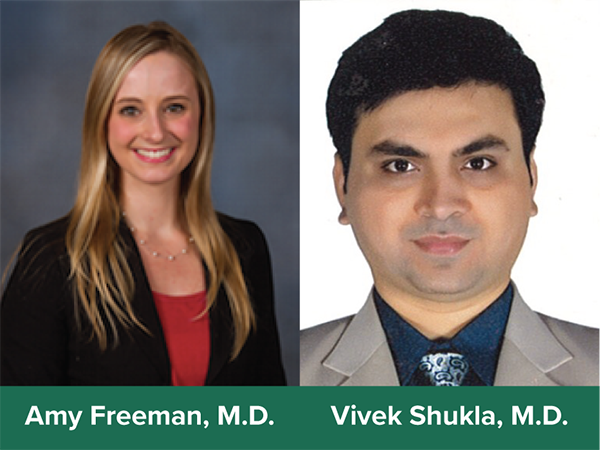 Amy Freeman, M.D., First Year Fellow, and Vivek Shukla, M.D., First Year Fellow, Neonatology, received fellow research awards from the Society of Pediatric Research (SPR) as part of the Pediatric Academic Society (PAS) meeting. Though the PAS Meeting did not take place this year due to the COVID-19 pandemic, awards were handed out for submitted abstracts.
Amy Freeman, M.D., First Year Fellow, and Vivek Shukla, M.D., First Year Fellow, Neonatology, received fellow research awards from the Society of Pediatric Research (SPR) as part of the Pediatric Academic Society (PAS) meeting. Though the PAS Meeting did not take place this year due to the COVID-19 pandemic, awards were handed out for submitted abstracts.
Dr. Freeman received the SPR Fellow’s Basic Research Award for her research “Germ Free Mice are Protected whereas Humanized Mice with Severe BPD Airway Microbiome Develop severe Lung Injury in Hyperoxia.”
Dr. Shukla received the SPR Fellow’s Clinical Research Award for his research “Effect of Indomethacin Prophylaxis on Cerebral and Abdominal Tissue Oxygenation by Near-Infrared Spectroscopy in Preterm Neonates.”
These awards are given annually to honor pediatric fellows who are engaged in clinical and basic science research and are designed to encourage trainees to pursue careers in academic pediatrics.
Congratulations Drs. Freeman and Shukla!
Pandemic Parenting: Tips from a pediatrician and mother
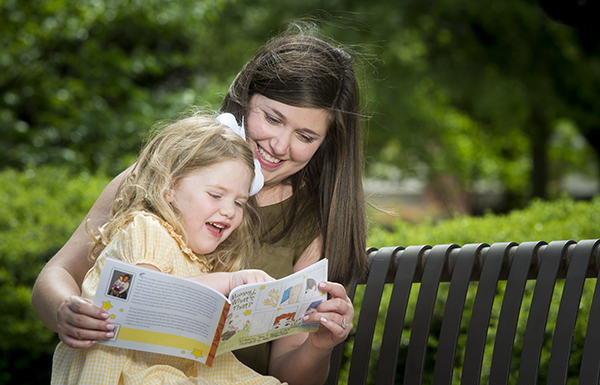 By: Lauren Nassetta, M.D., Pediatric Hospital Medicine
By: Lauren Nassetta, M.D., Pediatric Hospital Medicine
We are parenting during a pandemic. This is tough. And weird. And totally new. And really tough. Many of us are taking on childcare and the prospect of homeschooling while trying to work and still maintain some sense of ourselves during this time. My concerns (and maybe yours, too) can be summarized in three questions:
Are the children safe?
Experts predict an increase in accidental injuries at home as parents are trying to get work done and may be less vigilant. In addition, children are spending much more time at home than they ever have and may be more likely to explore areas and experiment with items that have not interested them in the past.
Now is the time to double-check your home for potential hazards, especially if it has been a while since you really considered household dangers. Where are your medicines and cleaning supplies? Nationwide, the sale of ammunition and firearms has soared as the virus has spread. If you own guns, have you made certain they are in a locked safe, the ammo is stored separately, and there is no way your children can get to either? If the children are outside, how safe is the yard? The neighborhood? The street? Do their bike helmets still fit?
Child-safety prep will obviously depend on the age and ability level of your children and how well they can be supervised while you work. If you feel like you cannot supervise adequately while working from home, consider taking turns with your partner if possible, working during naps, in the evenings or early mornings, or just accomplishing what you can while you are in the same space as the children.
Visit the American Academy of Pediatrics (AAP) website for resources on safety and injury prevention. Visit the Alabama Poison Information Center for information and guidance on common household items and local plants and animals that are dangerous to children.
Are the children ok?
What you say to your children about COVID-19 will depend on their ages and levels of understanding, but the same basic principles apply to most children. Most importantly, be authentic in your conversations with them. They know that life is different and recognize that things are not perfectly rosy, so there is no need to pretend. Honesty does not mean free reign to dump all your fears, concerns or frustrations on them though. Name your feelings and then ask them to name theirs: “I am feeling a little anxious about all of this. How are you feeling?” or “Is anything worrying you?” Asking more specific questions may help, too. “How are you feeling about not having school?” “What do you think you’ll miss most?” “What is the best part about not having school?”
Click here for an article from UAB News with additional tips on talking to your children about COVID-19.
This is also a good time to model healthy behaviors and start practices that will serve them and you well now and in the future. Daily journaling might be a good activity for the whole family. Even many kindergarteners can write well enough to start a journal, and if they cannot write they can draw their daily entries. Journal prompts can be short, simple and even the same every day. We’ve been using “Today in 6 Words,” in which we write a phrase or a few words to describe the day. Since many of us are more likely to be at home in the evenings, be intentional about eating dinner together. Eliminate screens and other distractions during the meal. Talk to one another. Take turns saying one thing you are thankful for each day. Spend time outside every day.
Click here for journal prompt ideas.
Are the children learning?
Most of us have not had to be our children’s teachers before. And it is stressful! Practice patience and grace with the children and with yourself. They will learn enough, and they will be ok. As many of our children started school from home this week, we are all adjusting to this new normal. I am very thankful for the lesson plans and resources being provided by my children’s school and teachers. To help make this adjustment better for you and your children it might be best to come up with a loose schedule for school days. Be realistic both about what you and your children are going to be able to handle. It may also be a good idea to make some physical space in the house the “classroom”, even if it is a corner where school supplies go when they are not in use.
To help create some normalcy and routine, whenever you choose to begin your day (we have been starting our schedule at about 9 a.m. (no need to get up early!), it is ok to expect that the children are dressed in actual clothes, have eaten breakfast, and perhaps had a little exercise or a walk outdoors. Blocks of time throughout the day can be dedicated to academic time with screens, academic time without screens, quiet independent reading time, creative time, chores, and everyone’s favorite—recess (more outside time)! But it is important to realize the battles worth fighting. The important thing is to make your children feel comfortable in this new learning environment.
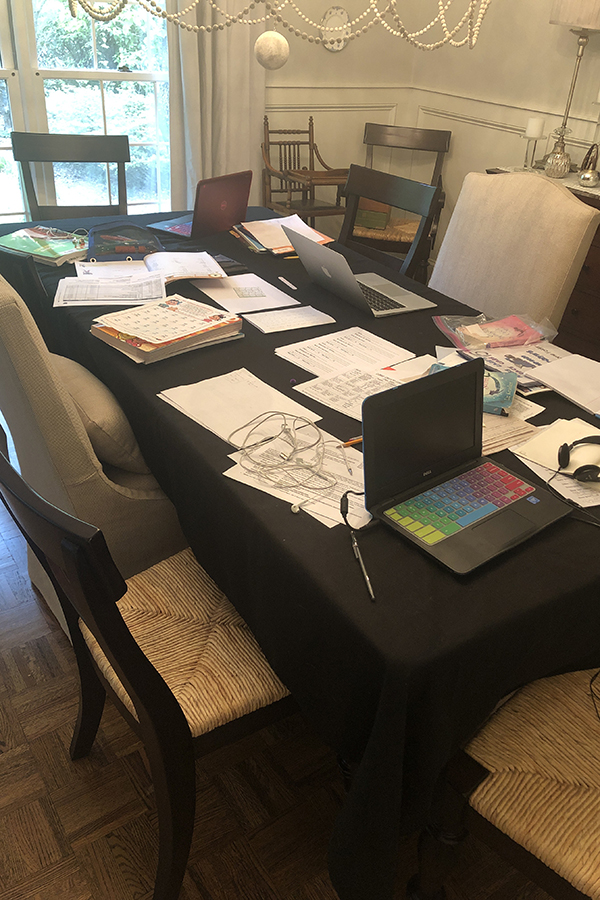 "We made our dining room table into the children's classroom," said NassettaAcademic time: Now that school is back in session, the resources provided by the teachers and schools are a huge help! There are additional resources available to help with your children’s learning during this time. Scholastic is offering free resources for school closures. Non-screen work can be hard to create. Journaling and writing a letter to a friend, grandparent or teacher are great activities. Grade-associated math workbooks are available on Amazon or other retailers, and you can find lots of worksheets online to print. If you can find the time, play a math game or two using cards or dice. The McWane Center has experiments on its website you can do at home. Look for ways for your children to have creative time every day. This does not need to be super-involved, messy (ok; it will be a little messy, but it comes before chore time!), or require specialized craft kits. Children will create with almost anything. Child-friendly scissors, markers or crayons, a glue stick, and some paper are perfect. Toilet paper rolls (ha!) or cardboard boxes are also great.
"We made our dining room table into the children's classroom," said NassettaAcademic time: Now that school is back in session, the resources provided by the teachers and schools are a huge help! There are additional resources available to help with your children’s learning during this time. Scholastic is offering free resources for school closures. Non-screen work can be hard to create. Journaling and writing a letter to a friend, grandparent or teacher are great activities. Grade-associated math workbooks are available on Amazon or other retailers, and you can find lots of worksheets online to print. If you can find the time, play a math game or two using cards or dice. The McWane Center has experiments on its website you can do at home. Look for ways for your children to have creative time every day. This does not need to be super-involved, messy (ok; it will be a little messy, but it comes before chore time!), or require specialized craft kits. Children will create with almost anything. Child-friendly scissors, markers or crayons, a glue stick, and some paper are perfect. Toilet paper rolls (ha!) or cardboard boxes are also great.
Chore time: This includes not only cleaning up messes but also doing something helpful around the home. Obviously, chores will need to be tailored to the ages and abilities of each child. Easy things many children can do include yard work, wiping down doorknobs and light switches, cleaning up the kitchen and doing dishes, sweeping the floor, dusting baseboards, taking out the trash, and organizing space in their rooms. Grace is important here, too. The tasks will not be done as well as you would do it, but there is ample evidence that doing chores is very good for children.
Recess: After chores, sunscreen them up, and send them outside. For hours. And hours. Until dinner time. Board games are great for rainy days. The evenings are a great time for them to catch up with friends virtually and have some non-academic screen time.
It is important to recognize all the great opportunities our children have now, that they may not have had time for when they were busy with school, homework, sports, music, and scouts. They have hours to explore every nook and cranny of the yard, build an entire kingdom out of blocks, and devise new and even more irritating ways to interact with their siblings. Though it is not traditional “education,” surely there is value in that.
The children are ok. They are safe, and they are learning. Take a deep breath, smile, and go enjoy some of this amazing time with them.
This article was written by Lauren Nassetta, M.D., Pediatric Hospital Medicine. Dr. Nassetta is the Chief Wellness Officer for the UAB Department of Pediatrics. She lives in Vestavia, Alabama with her husband and two children who are in the 2nd and the 4th grade.
Dr. Nassetta named Chief Wellness Officer for the Department of Pediatrics
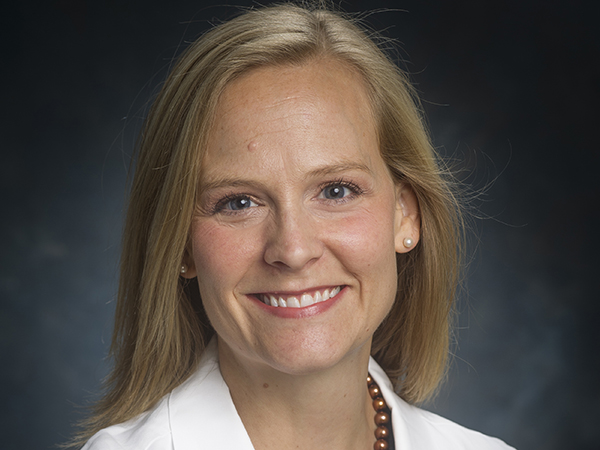 The Department of Pediatrics is pleased to announce Lauren Nassetta, M.D., Pediatric Hospital Medicine, as the chief wellness officer (CWO) for the department. “Before COVID-19, which was actually not so long ago, I asked Lauren Nassetta to be the chief wellness officer for the department,” said Dr. Cohen. “Dr. Nassetta has been a champion for faculty and trainee wellness and was an obvious and outstanding choice for the role. I promise to listen to her, and I hope you will too.”
The Department of Pediatrics is pleased to announce Lauren Nassetta, M.D., Pediatric Hospital Medicine, as the chief wellness officer (CWO) for the department. “Before COVID-19, which was actually not so long ago, I asked Lauren Nassetta to be the chief wellness officer for the department,” said Dr. Cohen. “Dr. Nassetta has been a champion for faculty and trainee wellness and was an obvious and outstanding choice for the role. I promise to listen to her, and I hope you will too.”
The CWO will be a central and senior advocate for prioritizing and promoting the well-being of all professionals, especially faculty, in the department. This role will have the authority and ability to have a positive influence on the department’s culture.
“I am thrilled to be the chief wellness officer for UAB Department of Pediatrics,” said Dr. Nassetta. “I hope to provide wellness opportunities and resources and promote the importance of wellness in the department. The goals Dr. Nassetta has for this new role include:
-
Providing opportunities for members of the department to improve whole-person wellness. Opportunities are not mandates. The purpose of this role is not to inflict wellness.
-
Advocating for environments and systems that support faculty and trainees and work with leaders to decrease stressors and barriers to thriving.
-
Attempting to lead by example, though it might be imperfect. There will likely be times where a little grace and understanding will be needed as this role continues to grow.
Dr. Nassetta will work closely with Tina Simpson, M.D., in the Office for Faculty Development to raise awareness about the importance of wellness and mental health, promote engagement and continue her leadership in this important area. Look for the Wellness Corner section in FYI Fridays each week for resources and opportunities and visit the Faculty Wellness website for additional information.
Dr. Walley named co-PI for Healthy Alabama 2030: Live HealthSmart
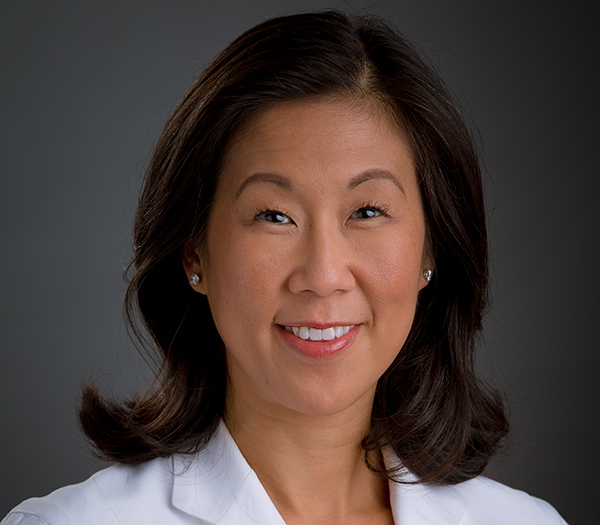 Susan Walley, M.D., Pediatric Hospital Medicine, has been named co-PI for Healthy Alabama 2030: Live HealthSmart. Dr. Walley will work on the smoking cessation portion of the project. She will focus on improving access to tobacco cessation resources and reducing tobacco use in the state. Currently 20.9% of adults in Alabama use tobacco products. “Tobacco use is the number one cause of preventable death and disease in Alabama,” said Dr. Walley. “I am excited and deeply committed to working with Live HealthSmart Alabama to lower the percentage of adult smokers in Alabama and provide access to tobacco cessation resources to our citizens.”
Susan Walley, M.D., Pediatric Hospital Medicine, has been named co-PI for Healthy Alabama 2030: Live HealthSmart. Dr. Walley will work on the smoking cessation portion of the project. She will focus on improving access to tobacco cessation resources and reducing tobacco use in the state. Currently 20.9% of adults in Alabama use tobacco products. “Tobacco use is the number one cause of preventable death and disease in Alabama,” said Dr. Walley. “I am excited and deeply committed to working with Live HealthSmart Alabama to lower the percentage of adult smokers in Alabama and provide access to tobacco cessation resources to our citizens.”
The Healthy Alabama 2030: Live HealthSmart project, led by Mona Fouad, M.D., UAB Minority Health & Health Disparities Research Center, was selected as the inaugural UAB Grand Challenge winner. The goal of the project is to improve the health of Alabama’s citizen through advancing good nutrition, physical activity and preventative wellness. Currently, Alabama ranks among the worst in the country in terms of obesity, high blood pressure and other health issues. With community partnership, Healthy Alabama 2030: Live HealthSmart seeks to move Alabama out of the bottom ten in national health rankings.
Introducing the Inaugural Best Resident Educator Award
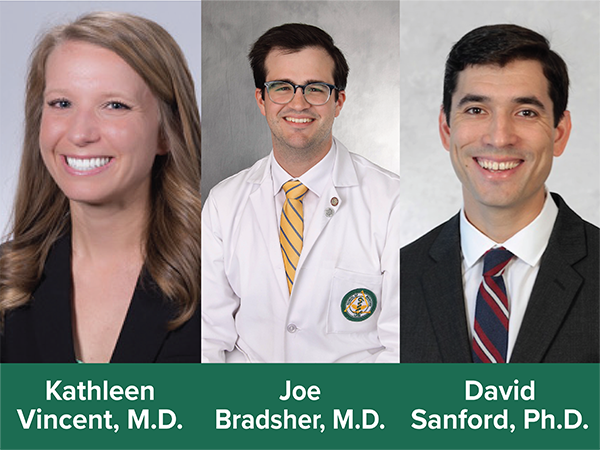 We would like to introduce the inaugural Best Resident Educator Award. This award was created to honor pediatric residents who excelled in service to medical student education. The award was voted on by third year UAB medical students following their pediatric clerkship. The medical students voted for the best resident educator from the PGY-1, PGY-2 and PGY-3/4 classes. Congratulations to the 2019-2020 Best Resident Educators!
We would like to introduce the inaugural Best Resident Educator Award. This award was created to honor pediatric residents who excelled in service to medical student education. The award was voted on by third year UAB medical students following their pediatric clerkship. The medical students voted for the best resident educator from the PGY-1, PGY-2 and PGY-3/4 classes. Congratulations to the 2019-2020 Best Resident Educators!
PGY-1
Kathleen Vincent, M.D., Pediatrics
PGY-2
Joe Bradsher, M.D., Med-Peds
PGY-3/4
David Sanford, M.D., Pediatrics
UAB Pediatrics residents attend Pediatric Legislative Day 2020
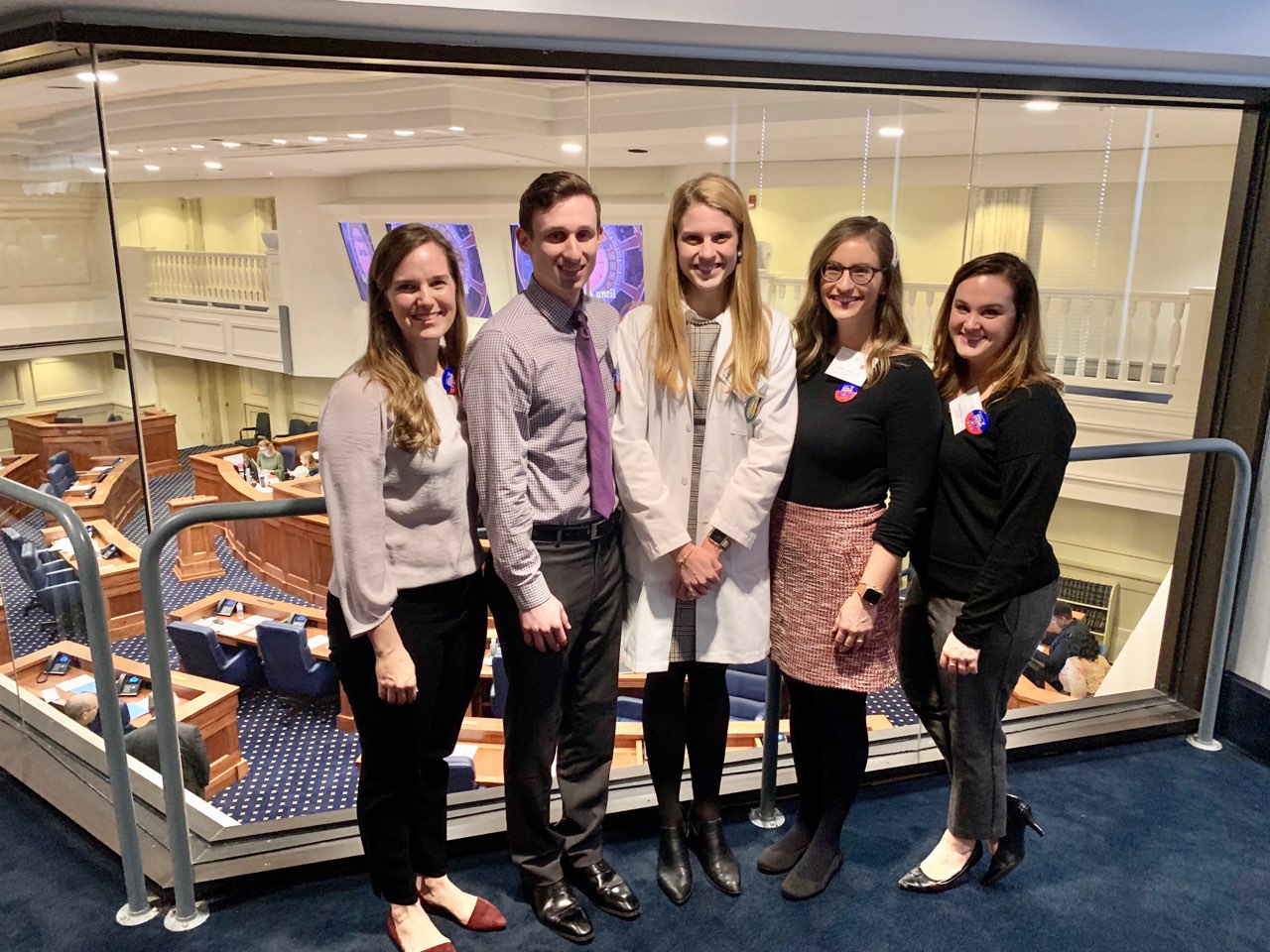 Mary Orr M.D., Pediatric Hospital Medicine, Justin Cimring M.D., PGY-1 Pediatric Resident, Chloe Meyer, M.D., PGY-1 Pediatric Resident, and Aubrey Coleman, M.D., PGY-2 Pediatric Resident The Alabama Chapter of the American Academy of Pediatrics (AAP) hosted the 17th Annual Pediatric Legislative Day Tuesday, March 5 at the Alabama State House in Montgomery. This legislative day is an opportunity for pediatricians across Alabama to learn about the legislative process and meet with lawmakers to discuss health issues impacting children in Alabama.
Mary Orr M.D., Pediatric Hospital Medicine, Justin Cimring M.D., PGY-1 Pediatric Resident, Chloe Meyer, M.D., PGY-1 Pediatric Resident, and Aubrey Coleman, M.D., PGY-2 Pediatric Resident The Alabama Chapter of the American Academy of Pediatrics (AAP) hosted the 17th Annual Pediatric Legislative Day Tuesday, March 5 at the Alabama State House in Montgomery. This legislative day is an opportunity for pediatricians across Alabama to learn about the legislative process and meet with lawmakers to discuss health issues impacting children in Alabama.
Representatives from the Pediatric Residency Program attended the day. Justin Cimring M.D., PGY-1 Pediatric Resident, Chloe Meyer, M.D., PGY-1 Pediatric Resident, and Aubrey Coleman, M.D., PGY-2 Pediatric Resident, joined Mary Orr M.D., Pediatric Hospital Medicine, in participating in the legislative day to advocate for issues related to pediatric health and learn about the legislative process in Alabama.
Dr. Walley speaks at congressional staff briefing on the youth vaping epidemic
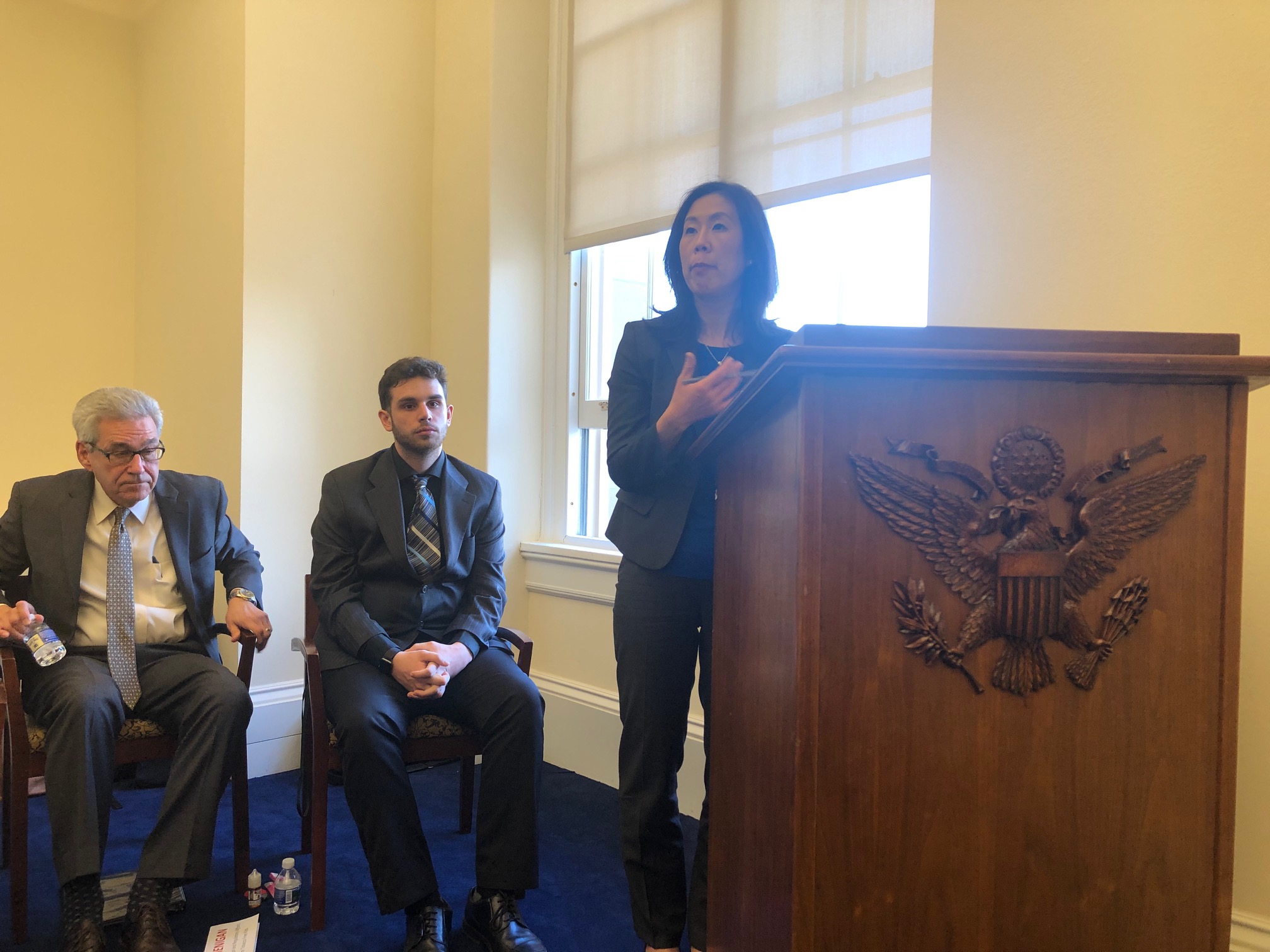
"Pediatricians are on the front lines of counseling youth and young adults about the harms posed by tobacco products," Dr. Walley remarked during the panel. "The latest data from the 2019 National Youth Tobacco Survey show that e-cigarettes are the most commonly used tobacco product among youth and 27.5% of high school students are current e-cigarette users. As pediatricians, we are seeing all too frequently how nicotine addiction takes hold in adolescent patients who use e-cigarettes."
After the staff briefing, the House voted to pass the Reversing the Youth Tobacco Epidemic Act. When asked about the House's passage of the legislation, Dr. Walley said, "the body of evidence is clear: flavors in tobacco products attract young users. The Reversing the Youth Tobacco Epidemic Act passed by the House will help prevent youth from starting tobacco use and pediatricians continue to have a vital role to prevent youth tobacco use and assist nicotine-addicted youth in quitting."
The Congressional Caucus to End the Youth Vaping Epidemic will now work to get the legislation introduced in the Senate.
Adolescent Health Center receives donation for Literacy Corner
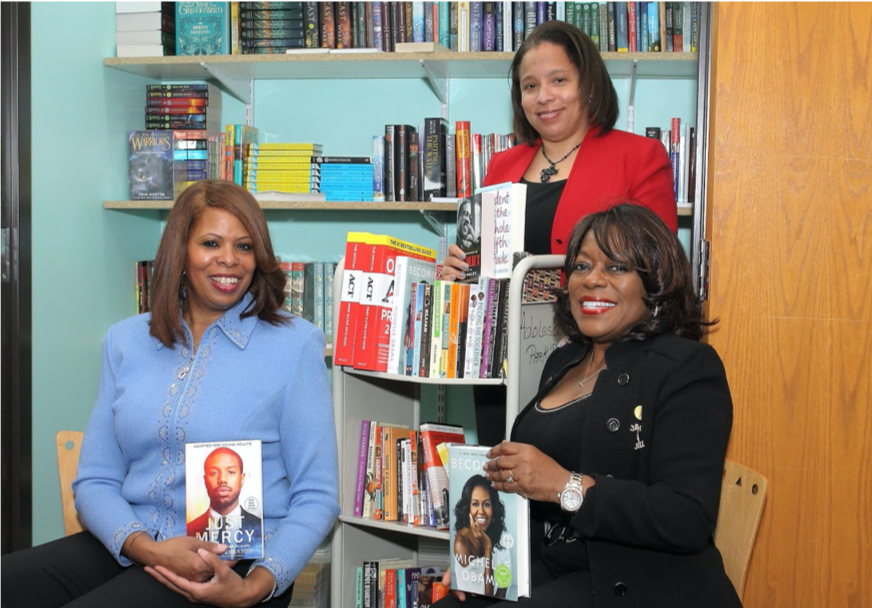 Drs. Tamera Coyne-Beasley and Nefertiti Durant and Patricia Bowman BillupsThe William A. Daniel, Jr. Adolescent Health Center received a generous donation from the Birmingham Chapter of Jack and Jill of America to our literacy corner. Patricia Bowman Billups, chair, Birmingham-Jack and Jill Associate Jewels presented the books to the AHC. One of the missions at the Adolescent Health Center is to promote literacy among young people and these donated books will assist the center is fulfilling this mission.
Drs. Tamera Coyne-Beasley and Nefertiti Durant and Patricia Bowman BillupsThe William A. Daniel, Jr. Adolescent Health Center received a generous donation from the Birmingham Chapter of Jack and Jill of America to our literacy corner. Patricia Bowman Billups, chair, Birmingham-Jack and Jill Associate Jewels presented the books to the AHC. One of the missions at the Adolescent Health Center is to promote literacy among young people and these donated books will assist the center is fulfilling this mission.
Dr. Dixon represents Department of Pediatrics at Howard University College of Medicine Residency Fair
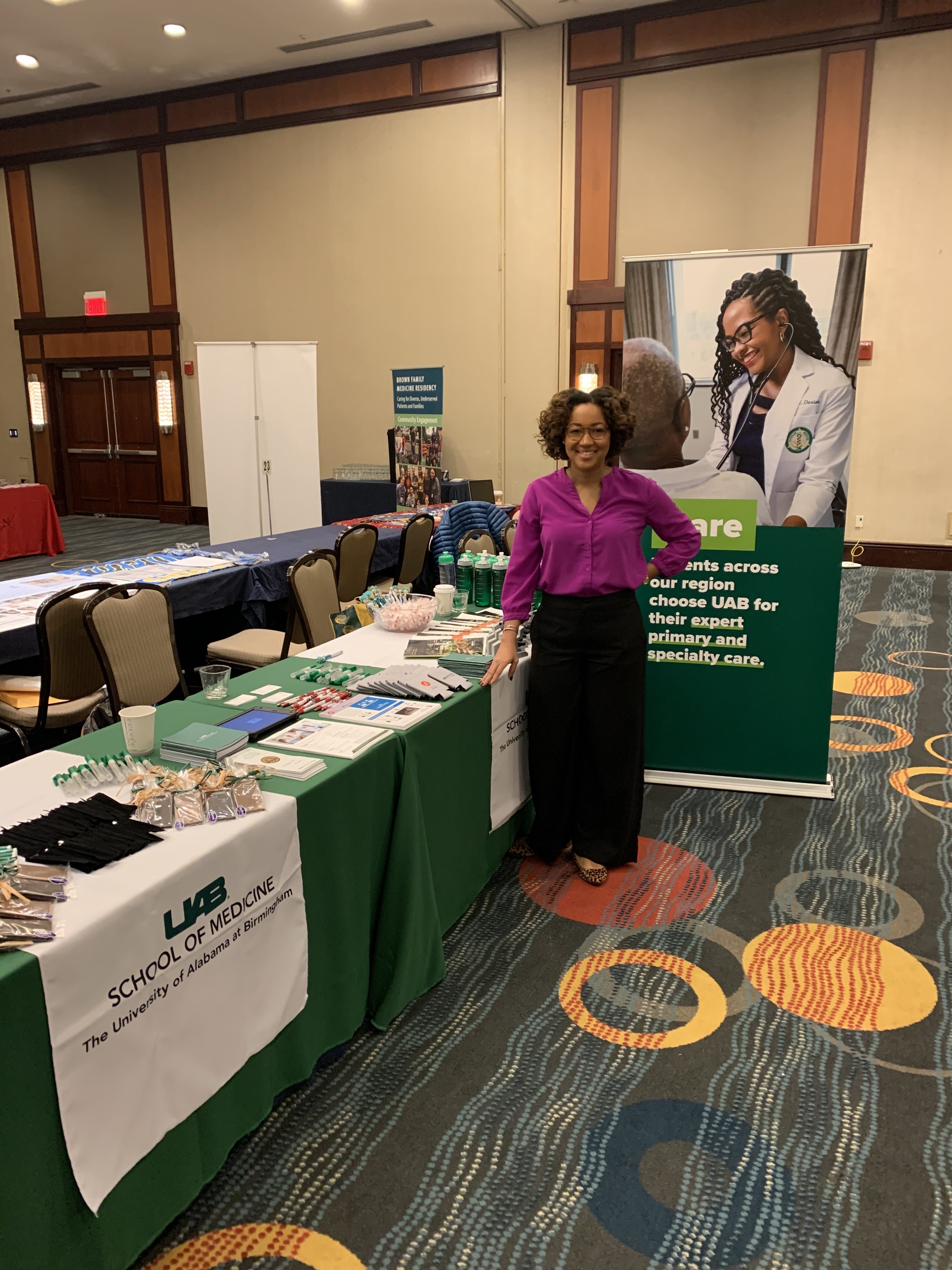
Other UAB residency programs had representatives in attendance including obstetrics and gynecology, internal medicine, pathology, and general surgery.
 Dr. Eunice Dixon and the other physician representatives from UAB
Dr. Eunice Dixon and the other physician representatives from UABDr. Coyne-Beasley participates in community conversations panel at special performance of 'Porgy and Bess'
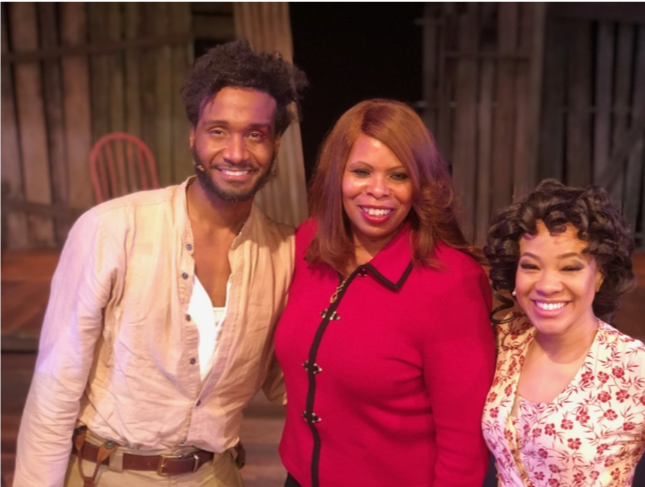 Dr. Tamera Coyne-Beasley with members of the "Porgy and Bess" cast.The UAB School of Medicine sponsored a private showing of the newly adapted production of "Porgy and Bess" at the Red Mountain Theater on Tuesday, Feb. 18 for School of Medicine faculty and staff. The play, adapted for the stage by George Gershwin, focuses on the underserved residents of a tenement in Charleston, SC. It addresses real-life issues such as addiction and violence. Following the performance, a reception was held for the School of Medicine attendees and a panel discussion, "Community Conversations," was moderated by Keith Cromwell, executive director of the Red Mountain Theater.
Dr. Tamera Coyne-Beasley with members of the "Porgy and Bess" cast.The UAB School of Medicine sponsored a private showing of the newly adapted production of "Porgy and Bess" at the Red Mountain Theater on Tuesday, Feb. 18 for School of Medicine faculty and staff. The play, adapted for the stage by George Gershwin, focuses on the underserved residents of a tenement in Charleston, SC. It addresses real-life issues such as addiction and violence. Following the performance, a reception was held for the School of Medicine attendees and a panel discussion, "Community Conversations," was moderated by Keith Cromwell, executive director of the Red Mountain Theater.
Tamera Coyne-Beasley, M.D., Adolescent Medicine, was a participant on the panel along with Tony Jones, M.D., senior associate dean for Clinical Affairs and the entire "Porgy and Bess" cast. The panel covered topics such as addiction, trust among marginalized communities and health care professionals, and other varying themes portrayed within the play as it relates to today’s society.
Dean Vickers spoke of the panel discussion in his Dean's Message on Black History Month and our diverse community.
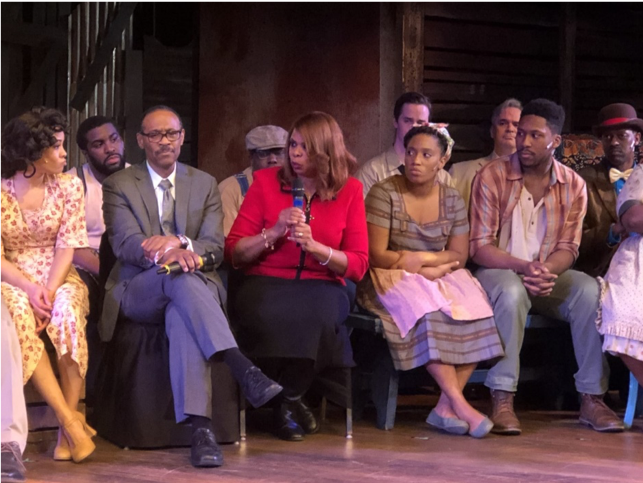 Drs. Tony Jones and Tamera Coyne-Beasley with "Porgy and Bess" cast during panel discussion
Drs. Tony Jones and Tamera Coyne-Beasley with "Porgy and Bess" cast during panel discussion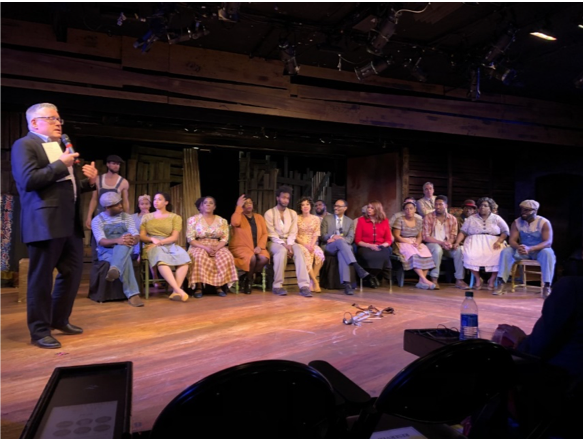 Keith Cromwell moderating the "Community Conversations" panel
Keith Cromwell moderating the "Community Conversations" panel
Dr. Bridges receives VERITY Travel Award
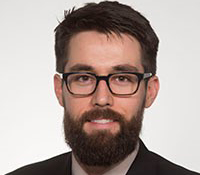 John Bridges, M.D., First Year Fellow-Rheumatology, has been awarded a partial travel award to attend the VERITY (Value and Evidence in Rheumatology using bioInformaTics, and advanced analYtics) research course in Boston this May. The travel award recipients are selected by the Childhood Arthritis and Rheumatology Research Alliance (CARRA). The partial travel awards are funded by the Arthritis Foundation. The VERITY/Brigham Course in Rheumatology Clinical Research is aimed at early career clinical investigators who are interested in rheumatic disease epidemiologic and patient-oriented research. During the course, attendees will receive training in developing research protocols and aims for grant proposals.
John Bridges, M.D., First Year Fellow-Rheumatology, has been awarded a partial travel award to attend the VERITY (Value and Evidence in Rheumatology using bioInformaTics, and advanced analYtics) research course in Boston this May. The travel award recipients are selected by the Childhood Arthritis and Rheumatology Research Alliance (CARRA). The partial travel awards are funded by the Arthritis Foundation. The VERITY/Brigham Course in Rheumatology Clinical Research is aimed at early career clinical investigators who are interested in rheumatic disease epidemiologic and patient-oriented research. During the course, attendees will receive training in developing research protocols and aims for grant proposals.
Congratulations Dr. Bridges!
Dr. Ross named a 2020 Stand Up To Superbugs Ambassador
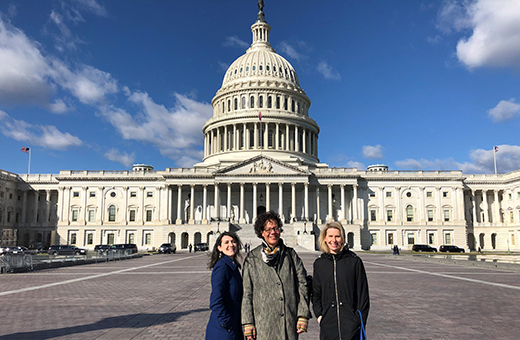 Dr. Shannon Ross (R) with other Superbug Ambassadors on Capitol Hill.For the fourth year, Shannon Ross, M.D., Pediatric Infectious Diseases, served as an ambassador for The Pew Charitable Trusts' Stand Up To Superbugs initiative. Dr. Ross joined more than 40 other 2020 Stand Up To Superbugs Ambassadors in Washington, DC Feb. 25-27 to meet with the Presidential Advisory Council on Combating Antibiotic-Resistant Bacteria, leaders from CDC, FDA, and other key agencies and members of Congress and their staffs to urge action to fight the growing threat of antibiotic-resistant infections. This year's ambassadors include people from several different fields including health care, public health, research, farming, veterinary medicine and patients and patient families impacted by superbugs. During their trip to Washington, the ambassadors meet with the representatives from their states to share their expertise and experience to advocate for funding and support to preserve the effectiveness of existing antibiotics and to develop new antibiotics.
Dr. Shannon Ross (R) with other Superbug Ambassadors on Capitol Hill.For the fourth year, Shannon Ross, M.D., Pediatric Infectious Diseases, served as an ambassador for The Pew Charitable Trusts' Stand Up To Superbugs initiative. Dr. Ross joined more than 40 other 2020 Stand Up To Superbugs Ambassadors in Washington, DC Feb. 25-27 to meet with the Presidential Advisory Council on Combating Antibiotic-Resistant Bacteria, leaders from CDC, FDA, and other key agencies and members of Congress and their staffs to urge action to fight the growing threat of antibiotic-resistant infections. This year's ambassadors include people from several different fields including health care, public health, research, farming, veterinary medicine and patients and patient families impacted by superbugs. During their trip to Washington, the ambassadors meet with the representatives from their states to share their expertise and experience to advocate for funding and support to preserve the effectiveness of existing antibiotics and to develop new antibiotics.
Dr. Colvin appointed to Professor Emeritus
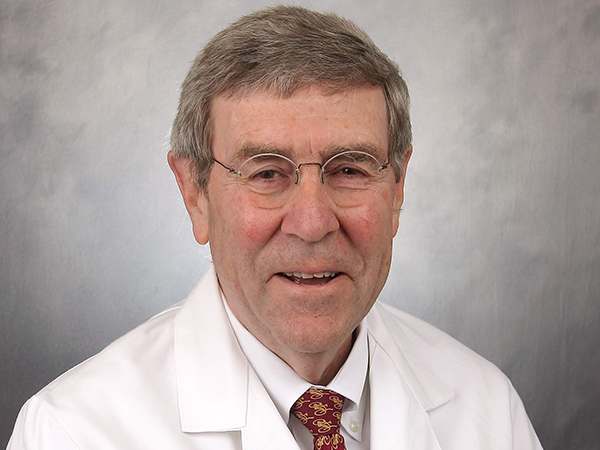 Ed Colvin, M.D., Pediatric Cardiology, has been appointed as Professor Emeritus in the School of Medicine. The appointment, approved by the Board of Trustees, is made in recognition of his outstanding service and years of dedication to the Department of Pediatrics, Heersink School of Medicine, and Children's of Alabama.
Ed Colvin, M.D., Pediatric Cardiology, has been appointed as Professor Emeritus in the School of Medicine. The appointment, approved by the Board of Trustees, is made in recognition of his outstanding service and years of dedication to the Department of Pediatrics, Heersink School of Medicine, and Children's of Alabama.
Dr. Colvin joined the Division of Pediatric Cardiology in 1983, serving as division director from 1990 to 2012. During his tenure as division director, he built a strong team of cardiologists spanning the full range of pediatric cardiology subspecialties. A true testament to his superb leadership, no cardiology faculty member has left the division since 1992. Dr. Colvin also played an instrumental part in the rebirth of UAB as a comprehensive state of the art pediatric and congenital cardiovascular program.
Always a forward thinking physician, in 1991 he developed, with the assistance of a computer programmer, an electronic repository that is still used by the division today. This repository is an integral part in the efficiency and organization of the division. He is an exemplary clinician, loved by his patients, and a kind and patient teacher.
Congratulations Dr. Colvin!
Dr. Hill awarded grant by UAB Center for AIDS Research
 Samantha Hill, M.D., MPH, Adolescent Medicine, was awarded grant funding from the UAB Center for AIDS Research (CFAR) Developmental Core: CFAR Ending HIV in Alabama Scientific Working Group for her pilot study “Evaluating Parental Support as a Strategy to Increase PrEP Adherence among Adolescents and Young Adults.” Dr. Hill's project seeks to understand the perspectives of adolescents and young adults regarding the use of parents and caregivers to assist with adherence to pre-exposure prophylaxis (PrEP). This project is a follow up to her Dixon Fellowship research project that sought to understand parent and caregiver perspectives about adolescents and young adults using PrEP.
Samantha Hill, M.D., MPH, Adolescent Medicine, was awarded grant funding from the UAB Center for AIDS Research (CFAR) Developmental Core: CFAR Ending HIV in Alabama Scientific Working Group for her pilot study “Evaluating Parental Support as a Strategy to Increase PrEP Adherence among Adolescents and Young Adults.” Dr. Hill's project seeks to understand the perspectives of adolescents and young adults regarding the use of parents and caregivers to assist with adherence to pre-exposure prophylaxis (PrEP). This project is a follow up to her Dixon Fellowship research project that sought to understand parent and caregiver perspectives about adolescents and young adults using PrEP.
Congratulations Dr. Hill!
Drs. Goldman and Haines awarded grant to study barriers to transplant in sickle cell disease
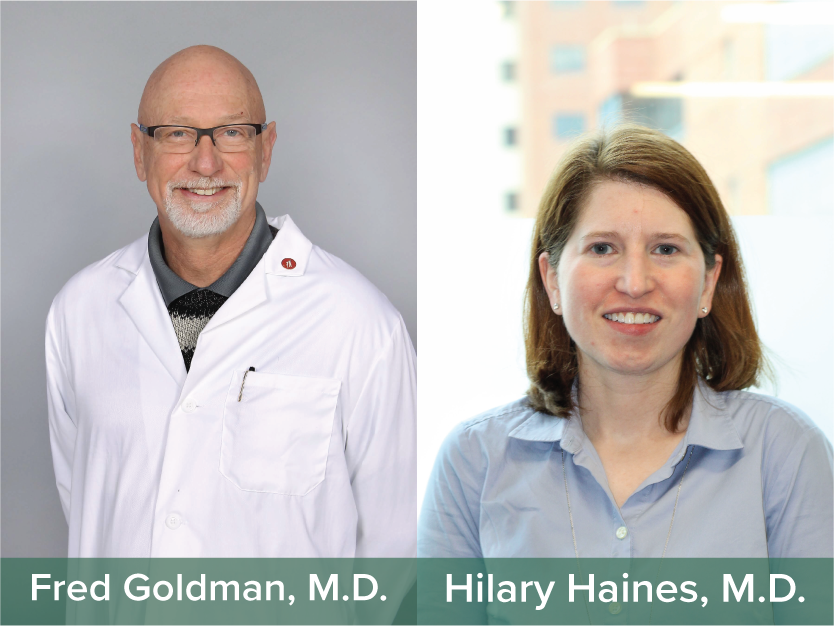 Fred Goldman, M.D., and Hilary Haines, M.D., Pediatric Hematology/Oncology, have been awarded a seed grant from the Sickle Cell Foundation of Birmingham to fund their project titled, “Barriers to Transplant in Sickle Cell Disease: A Survey of Patients and Families at Children’s of Alabama.” The grant will provide seed money to assist them in studying the barriers that contribute to why sickle cell patients at Children's of Alabama are not getting bone marrow transplants at the same rate as the rest of the country.
Fred Goldman, M.D., and Hilary Haines, M.D., Pediatric Hematology/Oncology, have been awarded a seed grant from the Sickle Cell Foundation of Birmingham to fund their project titled, “Barriers to Transplant in Sickle Cell Disease: A Survey of Patients and Families at Children’s of Alabama.” The grant will provide seed money to assist them in studying the barriers that contribute to why sickle cell patients at Children's of Alabama are not getting bone marrow transplants at the same rate as the rest of the country.
Congratulations Drs. Goldman and Haines!
Pediatric endocrine division renamed
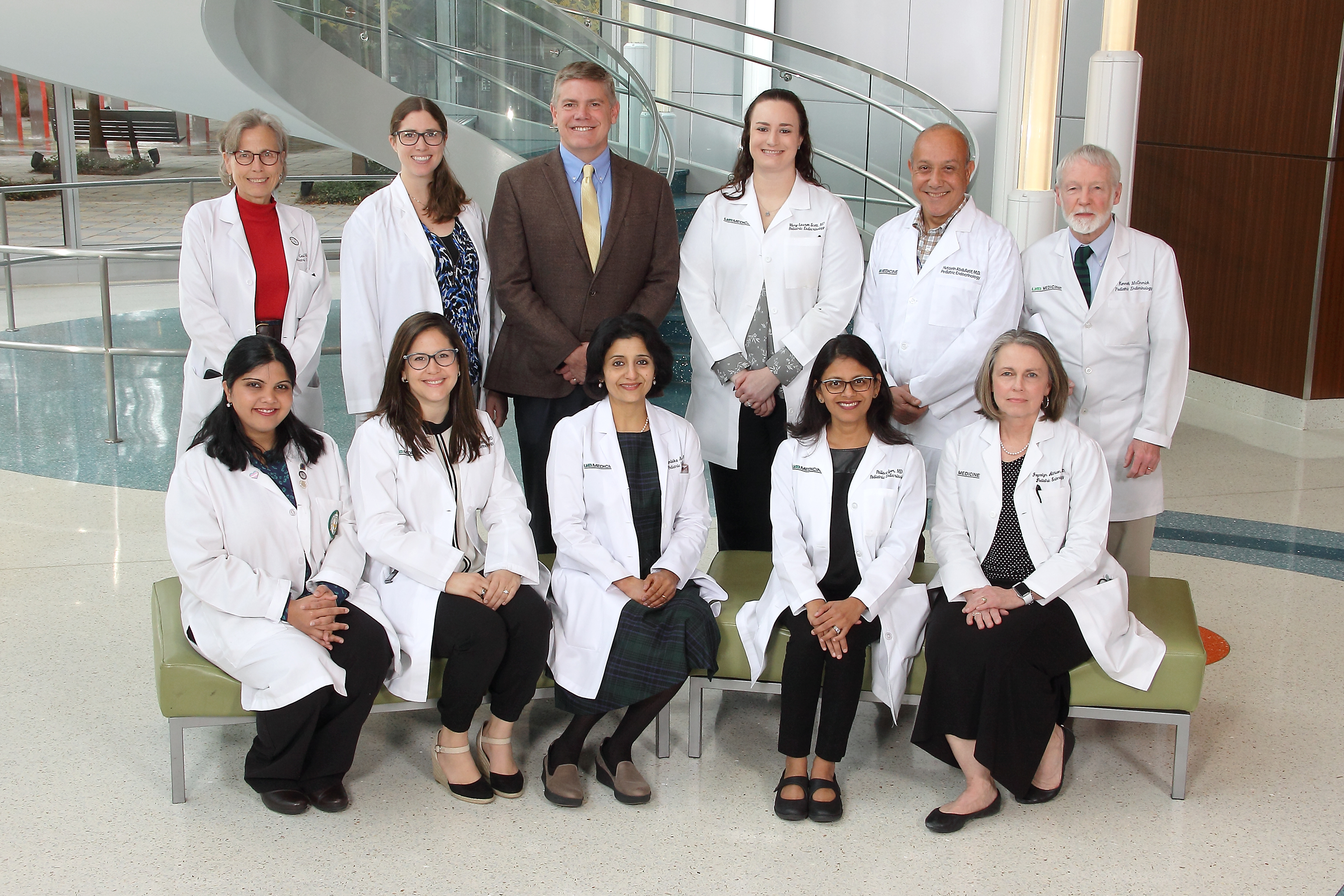 Effective immediately, the Endocrine Division has been renamed to the UAB Division of Pediatric Endocrinology and Diabetes. The change will also encompass the endocrine clinical service and training program. The name change was initiated by Ambika Ashraf M.D., division director for pediatric endocrinology and diabetes. Dr. Ashraf noted, in 1935, the subspecialty started as ‘pediatric endocrinology’ by Lawson Wilkins at the Harriet Lane Home, at Johns Hopkins Hospital. ‘Diabetes’ evolved in parallel as a clinical pediatric discipline from the clinics of Elliott Joslin and Priscilla White in Boston.
Effective immediately, the Endocrine Division has been renamed to the UAB Division of Pediatric Endocrinology and Diabetes. The change will also encompass the endocrine clinical service and training program. The name change was initiated by Ambika Ashraf M.D., division director for pediatric endocrinology and diabetes. Dr. Ashraf noted, in 1935, the subspecialty started as ‘pediatric endocrinology’ by Lawson Wilkins at the Harriet Lane Home, at Johns Hopkins Hospital. ‘Diabetes’ evolved in parallel as a clinical pediatric discipline from the clinics of Elliott Joslin and Priscilla White in Boston.
In 1980, both branches joined together to become pediatric endocrinology and diabetes. Since our division also encompasses both aspects, it is only appropriate to rename the division. Efforts to change references to the division online and in printed material has already begun and we ask that you do the same where appropriate.
Dr. Coghill named Waldemar A. Carlo, M.D., Endowed Professor in Clinical Neonatology
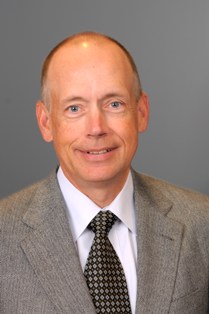 Carl Coghill, M.D., Neonatology, has been appointed the first holder of the Waldemar A. Carlo, M.D., Endowed Professorship in Clinical Neonatology. This endowed professorship recognizes the compassionate patient care and superior teaching Dr. Coghill exhibits.
Carl Coghill, M.D., Neonatology, has been appointed the first holder of the Waldemar A. Carlo, M.D., Endowed Professorship in Clinical Neonatology. This endowed professorship recognizes the compassionate patient care and superior teaching Dr. Coghill exhibits.
Dr. Coghill is the medical director of the Neonatal Intensive Care Unit (NICU) at Children’s of Alabama, the perinatal referral center for the state of Alabama. He is also the medical director for the Community Neonatology Program. His leadership and dedication to patient care have improved the medical care of neonates in community hospitals in the Birmingham area. Dr. Coghill has contributed greatly to advancing the field of neonatology by mentoring and training the next generation of neonatologists. Additional roles held by Dr. Coghill include, medical director for the Neonatal Simulation Lab, physician champion – High Reliability Unit, and medical director of the CRNP Skills Lab.
The Waldemar A. Carlo, M.D., Endowed Professorship in Clinical Neonatology was created and named to honor Dr. Wally Carlo for his many years of leadership as the division director of the Division of Neonatology.
Congratulations Dr. Coghill!
Dr. Freeman receives SSPR Young Investigator Award-Basic Science
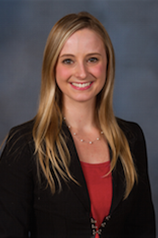 Amy Freeman, M.D., First Year Fellow-Neonatology, was awarded the SSPR Young Investigator Award-Basic Science at the Southern Society for Pediatric Research (SSPR) Annual Meeting in New Orleans last weekend. She won for her research titled, “Germ-free Mice are Protected but Humanized Mice with Diseased Airway Microbiome Develop Severe Lung Injury in Hyperoxia.”
Amy Freeman, M.D., First Year Fellow-Neonatology, was awarded the SSPR Young Investigator Award-Basic Science at the Southern Society for Pediatric Research (SSPR) Annual Meeting in New Orleans last weekend. She won for her research titled, “Germ-free Mice are Protected but Humanized Mice with Diseased Airway Microbiome Develop Severe Lung Injury in Hyperoxia.”
Congratulations Dr. Freeman!
Dr. Oates co-author of book chapter to help families with the management of cystic fibrosis
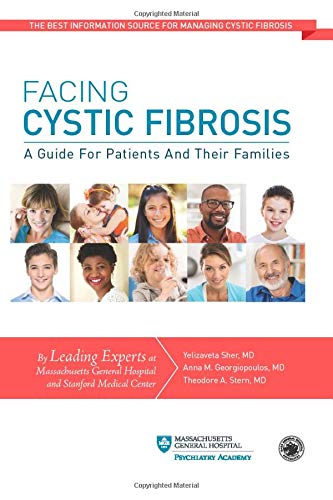 Gabriela Oates, Ph.D., Pediatric Pulmonary and Sleep Medicine, and Cathy Mims, MS-HQS, BSN, RN, CPN, Children's of Alabama CF Center Coordinator, are the co-authors of Chapter 7: “Which Types of Providers Can Help Me with My CF” in the new book “Facing Cystic Fibrosis.” The book was written by leading health care providers in their field and members of the cystic fibrosis community to provide resources and information for families on the management of cystic fibrosis.
Gabriela Oates, Ph.D., Pediatric Pulmonary and Sleep Medicine, and Cathy Mims, MS-HQS, BSN, RN, CPN, Children's of Alabama CF Center Coordinator, are the co-authors of Chapter 7: “Which Types of Providers Can Help Me with My CF” in the new book “Facing Cystic Fibrosis.” The book was written by leading health care providers in their field and members of the cystic fibrosis community to provide resources and information for families on the management of cystic fibrosis.
- 2020 Russell Cunningham Memorial Research Program-Call for Applications
- UAB Pediatric residents and fellows to present at Southern Regional Societies Annual Meeting
- Dr. Berger to participate in Innovation Academy's Train the Trainer Program
- Dr. Poole appointed to UAB Minority Health and Health Disparities Research Center